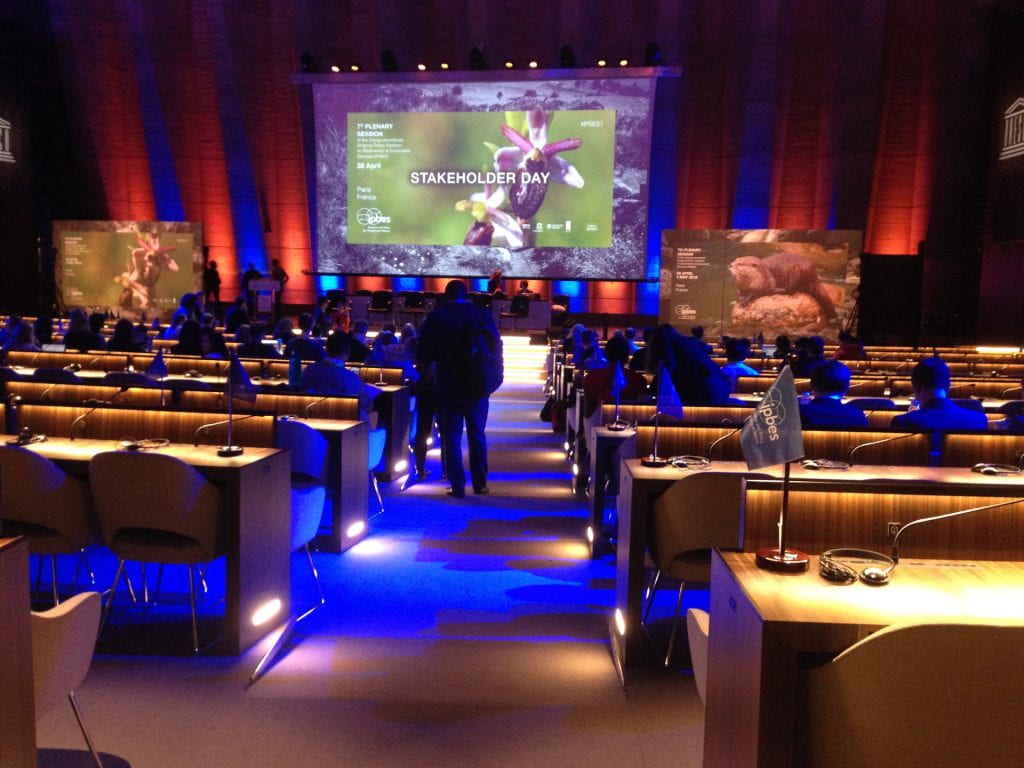The best intergovernmental platform that you’ve never heard of… until now
By c.washbourne, on 7 May 2019
Last week saw hundreds of people gather in Paris for what some have described as the ‘IPCC (Intergovernmental Panel on Climate Change) for nature’.
The ‘Intergovernmental Science-Policy Platform on Biodiversity and Ecosystem Services’, or IPBES to its friends, works to produce knowledge on the state of nature and to support the development of skills and capacity to promote its sustainable use. As an independent, intergovernmental body, IPBES spends much of its time building the policy case for biodiversity and ecosystem services; helping policy-makers to make more informed decisions for a sustainable future.
So why, might you ask, have you never heard anything about IPBES? Good question!
I was privileged to attended the most recent plenary meeting of the platform ‘IPBES-7’, which took place last week in Paris, as part of the delegation of the Young Ecosystem Services Specialists (YESS), and can offer a few possible answers.
IPBES is pretty young.
It was established back in 2012 through the collective effort of 94 governments. A relative toddler in the world of intergovernmental panels (IPCC, in comparison, was founded in 1988, back when Rick Astley was in the charts and Die Hard was hitting the cinemas!) IPBES has spent its foundational years fine tuning and formalising its methods and approaches and beginning to produce critical reviews on the state of nature. Many thousands of people have contributed to its work and its key knowledge insights are slowly emerging in to the public sphere. It may, of course, take some more years to reach full visibility, but the signs are encouraging. As the IPBES ‘Global Assessment on Biodiversity and Ecosystem Services’ emerged from embargo on 6th May 2019, thousands of international news corporations ran with IPBES inspired headlines from the BBC (‘Nature crisis: Humans ‘threaten 1m species with extinction’) to CNN (‘Is nature over? Maybe‘).
IPBES is heavily focussed on producing technical reports and policy documents.
Its assessment reports and other knowledge outputs to date have often been tailored towards technical and decision-making audiences, meaning that they haven’t always been prime fodder for hitting the headlines. They do, however, strive to find their way on to the desks of people calling the shots in environmental decision-making. A lot of visible IPBES activities centre around its plenary meetings, like IPBES-7, which see the attendance of delegations of decision-makers, scientists and civil society actors from across the globe. Over six days of discussion at IPBES-7, the platform’s work to date and its programme for the coming years were respectively signed off and confirmed. Critically, the country-level representatives also agreed and approved two documents for release: the ‘Global Assessment on Biodiversity and Ecosystem Services’ and the ‘Summary for Policy Makers’ of the Global Assessment. These documents provide an important contribution to our knowledge, supporting action towards a more sustainable future.
IPBES forces us to face up to some very difficult truths.
Nature is a critical part of so many of our lives, supporting us even when we are unaware of it doing so. Many ecosystems across the planet are already seriously degraded, many others are in decline. Pollution, overexploitation and misuse are often to blame. Many of these harsh realities come as a direct or indirect consequence of human development. Good news, it isn’t… The IPCC has a similar struggle on its hands, convincing the world of the veracity and criticality of human-influenced climate change and, perhaps most importantly, leveraging appropriate action in the face of seemingly overwhelming challenges. For the IPCC, its words have now percolated in to policy and the public realm, sparking everything from global agreements to individual-level action on climate change. The findings of IPBES ‘Global Assessment…’, and other work, suggests that we need equally aspirational and strong commitments on nature, to ensure the continued quality of life on earth. Reassuringly, it seems that just this conversation in now on more and more people’s lips.
It isn’t always smooth sailing. Like any huge participatory process, IPBES has its challenges. It moves at a relatively slow pace, it has a limited budget and limited capacity. As an observer of IPBES-7, I experienced firsthand the sometimes frustrating and ironically slow pace at which materials discussing the urgency and global scope of challenges are agreed upon. However, through this measured and considered process IPBES has already increased our collective knowledge and brought to the fore many voices that had not previously been present in these platforms, most notably indigenous and local knowledge from across the globe. It has set itself a very high bar: to find consensus between many different world-views on the present and future of our global ecosystems.
The fact that we can collectively work together towards solving such grand challenges means that, while the future of nature remains in the balance, I walk away from IPBES-7 with renewed hope and a renewed drive to keep on working alongside the many other inspiring people who choose to face these big global issues head on. Hopefully you will only hear more and more about IPBES from hereon in.
 Close
Close


